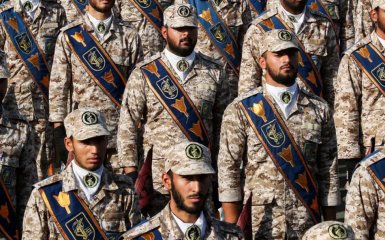Iran's armed forces are considered to be among the strongest in the region in terms of equipment, cohesion, experience and quality of personnel.
What a military threat to Israel is Iran
Earlier this month, Israel attacked a building in Iran's diplomatic compound in the Syrian capital of Damascus. In response, Iran launched an aerial attack on Israel involving hundreds of drones and missiles.
The direct military confrontation between Iran and Israel has once again drawn attention to Iran's armed forces. The New York Times analyzed the military potential of Iran's army and its capabilities.
Iran's armed forces are among the largest in the Middle East, with at least 580,000 active-duty soldiers and about 200,000 trained reserve personnel, split between the conventional army and the Islamic Revolutionary Guard Corps.
The Guard also runs the Quds Force, an elite unit responsible for arming, training and supporting a network of militants across the Middle East known as the "Axis of Resistance". These militants include Hezbollah in Lebanon, the Houthis in Yemen, militia groups in Syria and Iraq, Hamas and the Palestinian Islamic Jihad in Gaza.
Supreme Leader Ayatollah Ali Khamenei is the commander-in-chief of Iran's armed forces, who has the final say on all important decisions.
While the militants are not counted as part of Iran's armed forces, analysts say they are considered allied regional forces — combat-ready, well-armed and ideologically loyal — and could come to Iran's aid if attacked.
Iran's weapons: what is known
For decades, Iran's military strategy has been based on deterrence, focusing on the development of precision and long-range missiles, drones and air defenses. Iran has built a large fleet of speedboats and several small submarines capable of disrupting shipping and global energy supplies that pass through the Persian Gulf and the Strait of Hormuz.
Also, the publication notes, Iran has one of the largest arsenals of ballistic missiles and drones in the Middle East, including cruise missiles and anti-ship missiles, as well as ballistic missiles with a range of up to 2,000 km or more than 1,200 miles. They have the power and range to hit any target in the Middle East, including Israel.
In addition, experts say, in recent years Tehran has amassed a large inventory of drones with a range of about 1,200 to 1,550 miles, capable of flying at low altitudes to avoid radar.
At the same time, the country's military bases and warehouses are widely scattered, hidden deep underground and fortified with anti-aircraft defenses, so they are difficult to destroy with airstrikes.
International sanctions have cut off Iran from high-tech weapons and military equipment made abroad, such as tanks and fighter jets.
Today, Iran produces a large number of missiles and unmanned aerial vehicles domestically and prioritizes this defense production, experts say. It also imports small submarines from North Korea.
Weaknesses of Iran
According to experts, Iran's armed forces are significantly behind the power and sophistication of the armed forces of the United States, Israel and some European countries.
Iran's biggest weakness is its air force. Much of the country's aircraft date back to the era of Shah Mohammad Reza Pahlavi, who ruled Iran from 1941 to 1979, and many have been disabled due to a lack of spare parts. Iran's tanks and armored vehicles are old, and the country has only a few large naval ships.
The assassinations of senior Iranian military officials are also expected to have some short-term impact on Iran's regional operations, removing commanders with years of experience and ties to allied militia leaders.
Nevertheless, the command system of the armed forces inside Iran remains intact, experts say.
The conflict between Iran and Israel: what is known
In early April, Iranian authorities accused Israel of allegedly attacking the Iranian consulate in the Syrian capital, Damascus. There was information that the victim of the attack was General Mohammad Reza Zahedi, the commander of the "Al-Quds" unit of the Islamic Revolutionary Guard Corps.
Iran threatened Israel with "retaliatory measures" for the alleged attack on the "consulate".
On April 14, Iran launched a large-scale air attack — dozens of kamikaze drones and missiles flew towards Israeli territory. In addition, Israel was struck from the territory of Lebanon.



